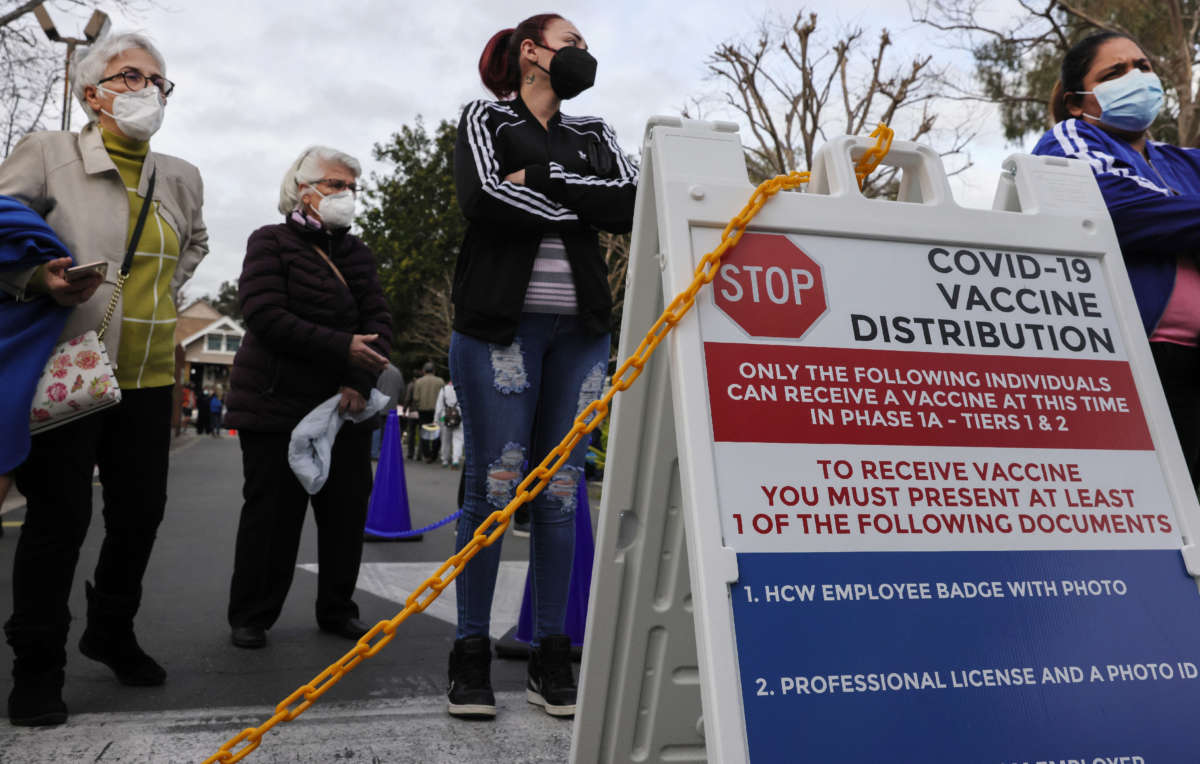Did you know that Truthout is a nonprofit and independently funded by readers like you? If you value what we do, please support our work with a donation.
Johnson & Johnson announced on Friday that its COVID-19 vaccine is 85 percent effective against severe COVID-19 infections, and no study participants who received the vaccine died or had to be hospitalized.
The results also show that the vaccine is 66 percent effective at preventing moderate to severe infection. The trials were conducted globally, and the vaccine was 72 percent effective at preventing moderate to severe infection in the U.S., 66 in Latin America and 57 percent in South Africa. These results were generally consistent across age and race, the company says.
In South Africa, 95 percent of the infections were due to the new, more transmissible variant of the virus. Some officials have said that this strain is more resistant to antibody treatments. So far, two cases of this strain have been identified in the U.S.
The vaccine could be authorized for use as early as mid-February, with Johnson & Johnson saying that it plans to apply for emergency authorization of the vaccine from the Food and Drug Administration (FDA) next week. The FDA has said that it will consider vaccines that are above 50 percent efficacy, and the Johnson & Johnson one exceeds that threshold.
Never miss another story
Get the news you want, delivered to your inbox every day.
The U.S. agreed last summer to purchase 100 million doses of the Johnson & Johnson vaccine had it proved effective.
Though this vaccine is less effective than those developed by Moderna and Pfizer, the trial results are still promising — as some point out, annual flu vaccines are only about 40 to 60 percent effective. Its ability to prevent hospitalization and death at a 100 percent success rate is crucial, and though the prevention of moderate infection varied across regions, the 85 percent prevention of severe infection was consistent worldwide.
One distinguishing factor between the Johnson & Johnson vaccine and the ones by Moderna and Pfizer/BioNTech is that it requires only one shot to be effective, while the others are a two-shot regimen. This could free up appointments for vaccine administers, allowing more people to get vaccinated once supply issues are fixed.
“A one-shot vaccine is considered by the World Health Organization to be the best option in pandemic settings, enhancing access, distribution and compliance. Eighty-five percent efficacy in preventing severe COVID-19 disease and prevention of COVID-19-related medical interventions will potentially protect hundreds of millions of people from serious and fatal outcomes of COVID-19,” said Paul Stoffels, chief scientific officer at Johnson & Johnson, in a statement. “It also offers the hope of helping ease the huge burden placed on healthcare systems and communities.”
Another compelling factor of the new vaccine is that it is much easier to store and transport; the Pfizer and Moderna vaccines have posed huge logistical challenges as they need to be stored at minus 70 and minus 20 degrees Celsius, respectively. In some places, improper storage has led vaccines to be thrown away. The Johnson & Johnson vaccine, on the other hand, can be stored at standard refrigerator temperatures for up to three months.
“Changing the trajectory of the pandemic will require mass vaccination to create herd immunity, and a single-dose regimen with fast onset of protection and ease of delivery and storage provides a potential solution to reaching as many people as possible,” said Mathai Mammen, the company’s global head of research and development. “The ability to avoid hospitalizations and deaths would change the game in combating the pandemic.”
Unlike the Pfizer and Moderna vaccines, which are a new type of vaccine that operate using genetic material called mRNA, the Johnson & Johnson vaccine uses a weakened version of the common cold to carry DNA into the body that helps the immune system recognize and fight the virus.
White House chief medical adviser Dr. Anthony Fauci has said that, with new strains of the virus emerging globally, now is the time to get as many vaccines administered as possible to quash the chances of mutant strains becoming dominant. Mass vaccination could also prevent the emergence of new strains.
Fauci also said earlier this week that, while there is currently no official guidance recommending that people wear two masks, it “makes common sense” to do so to prevent infection.
A terrifying moment. We appeal for your support.
In the last weeks, we have witnessed an authoritarian assault on communities in Minnesota and across the nation.
The need for truthful, grassroots reporting is urgent at this cataclysmic historical moment. Yet, Trump-aligned billionaires and other allies have taken over many legacy media outlets — the culmination of a decades-long campaign to place control of the narrative into the hands of the political right.
We refuse to let Trump’s blatant propaganda machine go unchecked. Untethered to corporate ownership or advertisers, Truthout remains fearless in our reporting and our determination to use journalism as a tool for justice.
But we need your help just to fund our basic expenses. Over 80 percent of Truthout’s funding comes from small individual donations from our community of readers, and over a third of our total budget is supported by recurring monthly donors.
Truthout has launched a fundraiser to add 500 new monthly donors in the next 9 days. Whether you can make a small monthly donation or a larger one-time gift, Truthout only works with your support.
